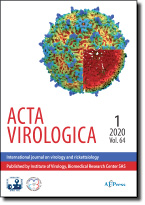Acta Virologica Vol.63, No.2, p.169-185, 2019
|
| Title: Absence of keratin 1 restricts the course of infection with lymphocytic choriomeningitis virus strain MX |
| Author: M. LABUDOVÁ, M. ZDURIENČÍKOVÁ, A. FABIANOVÁ, M. BARÁTOVÁ, P. DITTE, P. RADVAK, I. NEMČOVIČOVÁ, S. PASTOREKOVÁ, J. PASTOREK |
|
Abstract: A rodent-transmitted enveloped lymphocytic choriomeningitis virus (LCMV) is an RNA virus causing persistent infection. During persistent infection, a unique strain MX of LCMV does not yield infectious virions, therefore it is not able to use a receptor for its dissemination, and spreads by cell-to-cell contacts. Virus can be transported to the neighboring cell by different cellular structures such as tunneling nanotubes or cytonemes. Using q-PCR, immunofluorescence, siRNA and western blot, we show that keratin 1 (K1) is essential for the persistent infection caused by LCMV strain MX, and its absence very effectively slows down the course of infection. In contrast, other LCMV strains, namely Clone 13 and Armstrong, which produce expression of K1, desmosomes in cells expressing K1 (42-MG-BA) but not in cells without K1 expression (NIH/3T3). We conclude that the presence of the virus enhances the K1 expression, while the presence of K1 protein potentiates the viral spread in persistently infected cells.
|
|
| Keywords: lymphocytic choriomeningitis virus; keratin 1; persistent infection; desmosomes; virus transport |
|
|
Published online: 28-May-2019
|
| Year: 2019, Volume: 63, Issue: 2 |
Page From: 169, Page To: 185 |
doi:10.4149/av_2019_209
|
|
 download file download file |
|
|
|
|
 download file
download file
